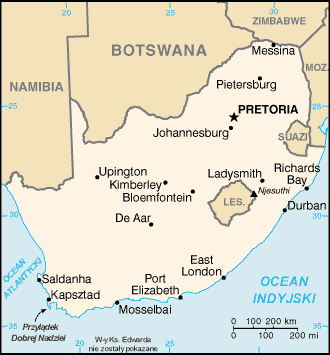In this economic guide to South Africa we’ll give you an overview of the South African economy, including the country’s primary imports and exports of goods and services, as well as their primary destinations.
Contents
- Economy of South Africa – Overview
- South Africa’s GDP
- South Africa’s Top 5 Commodity Exports
- South Africa’s Top 5 Commodity Imports
- More Information on South Africa’s Commodities
- Interesting Facts About South Africa
- Regulated Brokers: Where Can I Trade Commodities?
- Further Reading
- Subscribe to our Newsletter
Economy of South Africa – Overview
South Africa is the 36th largest export economy in the world. It ended up with a positive trade balance of $19.6 billion after deducting its annual import total of $95.5 billion from a yearly export total of $115 billion.

South Africa’s GDP
South Africa’s GDP is $368 billion which ranks it 32nd overall.
GDP per capita for South Africa is $6,374, which ranks much lower – 97th out of 196 countries.
South Africa’s Top 5 Commodity Exports
- Gold – $17.9 billion
- Platinum – $9.1 billion
- Coal Briquettes – $6.7 billion
- Iron Ore – $4.7 billion
- Ferroalloys – $4.0 billion
South Africa’s Other Notable Exports
- Diamonds – $9.4 billion
- Cars – $6.8 billion
- Manganese Ore – $3.5 billion
- Delivery Trucks – $3.1 billion
- Chromium Ore – $1.9 billion
China is the top export destination for South African products ($18.1 billion), followed by the United Kingdom ($8.8 billion), the United States ($7.9 billion), Germany ($7.2 billion), and India ($7.1 billion).
South Africa’s Top 5 Commodity Imports
- Crude Petroleum – $11.0 billion
- Refined Petroleum – $4.8 billion
- Gold – $2.1 billion
- Raw Copper – $0.9 billion
- Aluminum Oxide – $0.7 billion
South Africa’s Other Notable Imports
- Cars – $4.2 billion
- Vehicle Parts – $3.3 billion
- Broadcasting Equipment – $2.7 billion
- Packaged Medicaments – $2.0 billion
- Computers – $1.4 billion
More Information on South Africa’s Commodities
Here we provide more analysis of South Africa’s trading products.
Platinum
South Africa is the largest exporter of platinum in the world and has a 28.5% market share of a global annual export market worth $32 billion.
Although the country still leads the way in terms of export volumes, the World Platinum Council predicts volumes to decline, with some mines closing or slowing production.
The decline in platinum production across the globe can be largely attributed to a fall in demand from the autocatalyst manufacturing sector, which accounts for about 40% of all platinum use.
Coal Briquettes
South Africa has a 4.7% share of the global export market, which is worth $142 billion annually.
Australia dominates the market with a 40% market share and South Africa is the sixth-largest exporter behind Indonesia, Russia, the United States, and Colombia.
India is a major destination for the country’s coal briquettes, taking 39% of all South Africa’s exports, followed by Pakistan, which imports 13.5% of South Africa’s annual export total.
Other countries receiving coal briquettes from South Africa include South Korea, the Netherlands, and Chinese Taipei.
Iron Ore
South Africa is the third largest exporter of iron ore and has a 5% share of a global export market valued at $95.1 billion annually.
Iron ore is in demand for construction projects around the world and the value of iron exports has grown by 2.34% in the most recent five-year period.
Diamonds
South Africa is practically synonymous with diamonds so it’s not surprising that it’s the 6th largest exporter of diamonds in the world and has a 8.1% share of a global market worth $116 billion.
The countries that export more diamonds than South Africa are India, Belgium-Luxembourg, the United States, Israel, and United Arab Emirates.
South Africa’s three largest mines are designed to expand their outputs and are predicted to maintain a viable production level for up to 50 more years.
Interesting Facts About South Africa
- South Africa is the only country in the world to have voluntarily abandoned its nuclear weapons program.
- The country has three official capital cities. Pretoria, the Executive Capital; Cape Town, the Legislative Capital; and Bloemfontein, the Judicial Capital.
- Table Mountain in Cape Town is believed to be one of the oldest mountains in the world and is also one of the planet’s identifiable energy centers.
- South Africa has eleven official languages, which is more than any other country.
All figures based on OEC/IMF 2018 calculations and projections unless otherwise stated.
Regulated Brokers: Where Can I Trade Commodities?
Start your research with reviews of these regulated brokers available in .
CFDs are complex instruments and come with a high risk of losing money rapidly due to leverage. Between 74%-89% of retail investor accounts lose money when trading CFDs. You should consider whether you can afford to take the high risk of losing your money.
Further Reading
- Commodity.com Guide to Commodity Brokers
- Commodity.com Guide to CFD Brokers
- Guide to Trading Precious Metals Commodities
- Guide to Trading Gold


